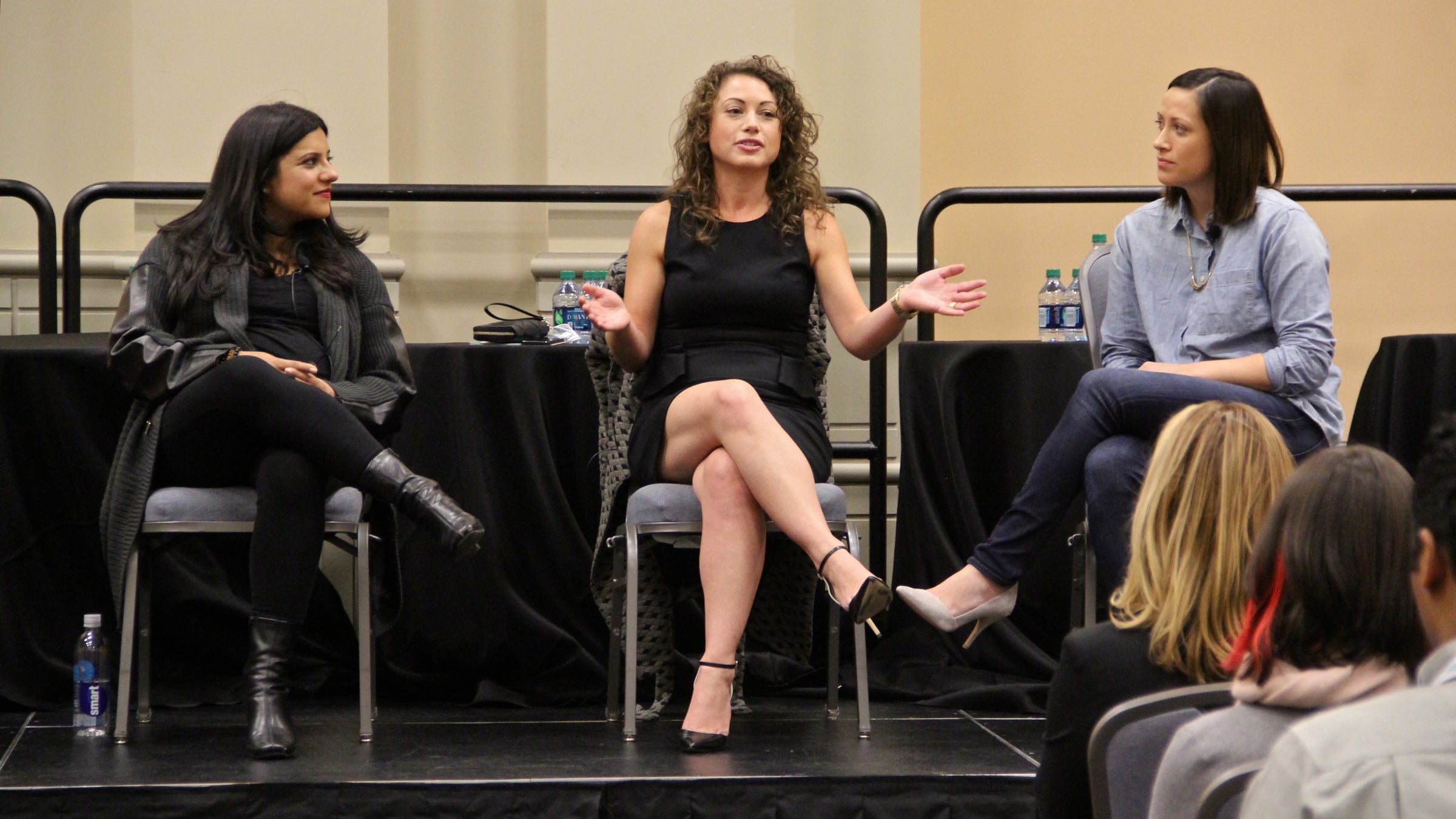Science and innovation highlights from the Forbes Under 30 Summit
Listen
Panelists (from left) Reshma Saujani
The Forbes Under 30 Summit brought hundreds of members of the magazine’s “30 Under 30” lists to the Philadelphia Convention Center this week.
The Forbes Under 30 Summit brought hundreds of members of the magazine’s “30 Under 30” lists, as well as nominees for next year, business leaders and mentors, to the Philadelphia Convention Center this week.
This first summit may have lacked the cool factor of the “Under 30” party at South by Southwest last year (it was held, we’re told, at the house of the head of the Patron tequila company and featured an ice bar), but it did feature headliners Monica Lewinsky, Questlove and Malala Yousafzai.
STEMing the ‘bro’ culture
At a talk called “STEMing the Bro-Culture” on Monday, three panelists dispensed advice on how to recruit and retain women in science, tech, engineering and math fields.
The underrepresentation of women in the quickly-growing, well-paying tech field has long been an economic equality issue for women. The recent Gamergate scandal, which sent two women in the video game industry into hiding, due to fears for their safety, also brought renewed attention to complaints of workplace hostility and sexual harassment for women in male-dominated tech offices.
Today, about a quarter of workers in so-called “STEM” fields are women.
“When I entered undergrad in 2001, in the computer science department in my school, there were more students named David than women,” said an audience member during a question-and-answer session after the panel.
The audience member went on to ask what he needed in his start-up to ensure gender equality from the beginning.
“Women right now,” responded Julie Ann Horvath, a Seattle-based designer and developer. “You need to be able to put women in a position of power and authority right now, before it’s too late.”
Girls Who Code founder Reshma Saujani stressed family–friendly workplace policies.
“For us, we have five months paid parental leave,” Saujani said. “I can’t afford it, but we do it. So I think really thinking about what your policies are, [is] really, really important.”
Also important, panelists stressed, is reaching girls early, before many seem to lose interest or shy away from science and math in middle school.
Saujani, whose organization teaches girls to program in summer immersion programs and extra-curricular clubs, stresses education and female role models in tech, even fictional ones, as a way to encourage girls to pursue computer science.
“We went from ten percent to 45 percent of doctors and lawyers being women because of ‘Grey’s Anatomy’ and ‘L.A. Law,’“ Saujani said. “You were constantly inundated with these fabulous women who were being doctors and lawyers. And girls said you know what, I can do that too. We’re not doing that with technology.”
Pitching for dollars
Part of the Forbes “Under 30 Summit” also included a $400,000 competition for start-ups. The “pressure cooker” event gave five finalists five minutes each to impress a trio of judges, including AOL founder Steve Case.
One of the contenders was Philly-based start-up Milkcrate.
“It is kind of like a hyper-local green Yelp, but the plan is to make it a digital app for the sustainability community everywhere,” said Morgan Berman, the 29-year-old founder.
With more than 2,000 listings in 20 different categories, ranging from restaurants that source locally to renewable energy providers, Milkcrate is positioning itself as the go-to resource for all things green. Right now, it is only serving Philadelphia, but it hopes to expand to other cities in the near future.
On stage, lights glaring and cameras rolling, Berman delivered a well-rehearsed pitch detailing Milkcrate’s value in front of a crowd of hundreds of similarly eager millennials.
“At the core of what we are doing is bringing together three different groups,” she said. “Consumers who care about living sustainably, businesses who are passionate about the way they run their companies, and the organizations that champion them all.”
The judges, though, didn’t go with one of the hometown favorites. (The other local entrant was TowerView Health, which offers a medication scheduling system.)
Enrou, an L.A.-based online marketplace offering socially-conscious products, took home the cash.
Berman, in true entrepreneurial fashion, shrugged off the defeat.
“We didn’t win, but we have gotten so much positive feedback from what happened here today, that like, it is still fantastic and I’m really glad and grateful that we got to be here,” she said.
WHYY is your source for fact-based, in-depth journalism and information. As a nonprofit organization, we rely on financial support from readers like you. Please give today.



